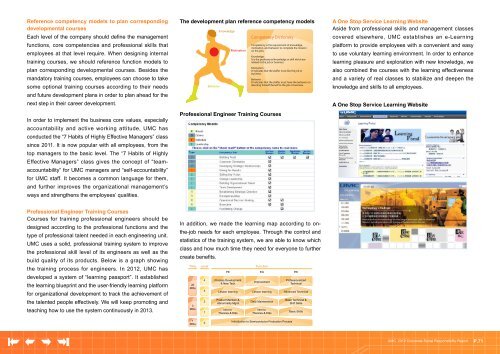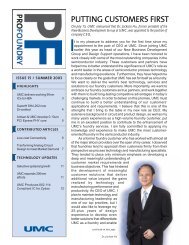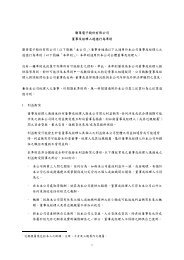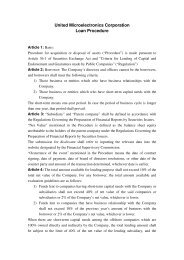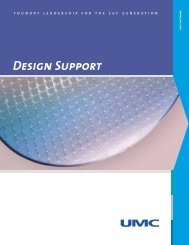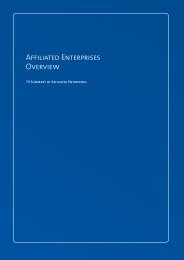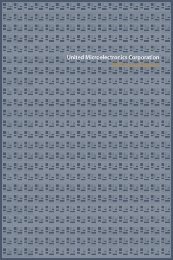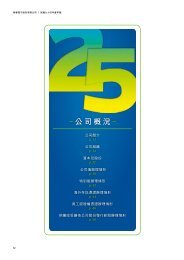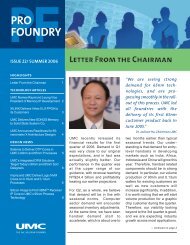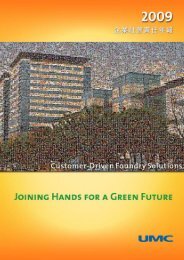2012 Corporate Social Responsibility Report - UMC
2012 Corporate Social Responsibility Report - UMC
2012 Corporate Social Responsibility Report - UMC
Create successful ePaper yourself
Turn your PDF publications into a flip-book with our unique Google optimized e-Paper software.
Reference competency models to plan corresponding<br />
developmental courses<br />
Each level of the company should define the management<br />
functions, core competencies and professional skills that<br />
employees at that level require. When designing internal<br />
training courses, we should reference function models to<br />
plan corresponding developmental courses. Besides the<br />
mandatory training courses, employees can choose to take<br />
some optional training courses according to their needs<br />
and future development plans in order to plan ahead for the<br />
next step in their career development.<br />
In order to implement the business core values, especially<br />
accountability and active working attitude, <strong>UMC</strong> has<br />
conducted the “7 Habits of Highly Effective Managers” class<br />
since 2011. It is now popular with all employees, from the<br />
top managers to the basic level. The “7 Habits of Highly<br />
Effective Managers” class gives the concept of “teamaccountability”<br />
for <strong>UMC</strong> managers and “self-accountability”<br />
for <strong>UMC</strong> staff. It becomes a common language for them,<br />
and further improves the organizational management’s<br />
ways and strengthens the employees’ qualities.<br />
The development plan reference competency models<br />
Behavior<br />
Knowledge<br />
Motivation<br />
Competency Dictionary<br />
Competency is the requirement of knowledge,<br />
motivation, and behavior to complete the mission<br />
on the jobs.<br />
Knowledge:<br />
It is the professional knowledge or skill which are<br />
related to the job or business.<br />
Motivation:<br />
It indicates that the staffer must like the job or<br />
business.<br />
Behavior:<br />
It indicates that the staffer must have the behavior on<br />
devoting himself/herself to the job or business.<br />
Professional Engineer Training Courses<br />
A One Stop Service Learning Website<br />
Aside from professional skills and management classes<br />
covered elsewhere, <strong>UMC</strong> establishes an e-Learning<br />
platform to provide employees with a convenient and easy<br />
to use voluntary learning environment. In order to enhance<br />
learning pleasure and exploration with new knowledge, we<br />
also combined the courses with the learning effectiveness<br />
and a variety of real classes to stabilize and deepen the<br />
knowledge and skills to all employees.<br />
A One Stop Service Learning Website<br />
Professional Engineer Training Courses<br />
Courses for training professional engineers should be<br />
designed according to the professional functions and the<br />
type of professional talent needed in each engineering unit.<br />
<strong>UMC</strong> uses a solid, professional training system to improve<br />
the professional skill level of its engineers as well as the<br />
build quality of its products. Below is a graph showing<br />
the training process for engineers. In <strong>2012</strong>, <strong>UMC</strong> has<br />
developed a system of “learning passport”. It established<br />
the learning blueprint and the user-friendly learning platform<br />
for organizational development to track the achievement of<br />
the talented people effectively. We will keep promoting and<br />
teaching how to use the system continuously in 2013.<br />
In addition, we made the learning map according to onthe-job<br />
needs for each employee. Through the control and<br />
statistics of the training system, we are able to know which<br />
class and how much time they need for everyone to further<br />
create benefits.<br />
Time Level Function<br />
PE EQ PEI<br />
20<br />
Mths<br />
3<br />
Mths<br />
4<br />
3<br />
2<br />
1<br />
Process Development<br />
& New Tech.<br />
Lesson learning<br />
Product Maintain &<br />
Abnormality Mgmt<br />
Intro to<br />
Theories & EQs<br />
Improvement<br />
Lesson learning<br />
Daily Maintenance<br />
Intro to<br />
Theories & EQs<br />
Professionalized<br />
Technical<br />
Advanced Technical<br />
Basic Technical &<br />
Shift Skills<br />
Basic Skills<br />
1<br />
Mths<br />
0<br />
Introduction to Semiconductor Production Process<br />
<strong>UMC</strong> <strong>2012</strong> <strong>Corporate</strong> <strong>Social</strong> <strong>Responsibility</strong> <strong>Report</strong><br />
P.71


